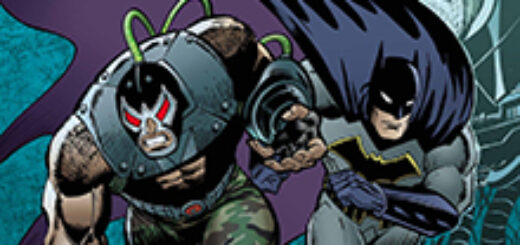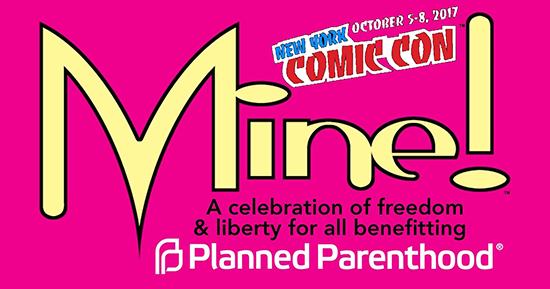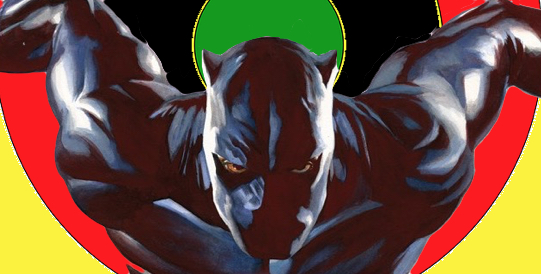For today’s column I was going to write about fan conventions. I’ve been covering fan conventions pretty non-stop since the con season really kicked into gear, and I’ve still got a plethora of great pictures, videos, and interviews to share. I’ve got interviews from Dragon Con with Bill Farmer, the cast of Arrow, and Mary McDonnell. I’ve got a report on the Harvey Awards and Baltimore Comic Con and all the great comics creators who were there. Heck, I’m not even done writing about SDCC panels, even though July seems like a distant memory now.
But instead of writing about all of that fun stuff, I’m going to be writing about something entirely different and much more distressing. And that is my thoughts as generated by the current state of the gaming community, in the wake of a series of events and attacks that is so widespread, nebulous, and in some instances so based on hearsay that it is difficult to condense into one comprehensive and reliable article with accompanying links. Instead of trying to cover every corner of what’s been going on, I’d like to address my own ruminations on what I’ve seen. But before I do that, here is one of the best summaries I’ve read of “Gamergate” and the events leading up to it.
Let’s move on to why I’m writing about this. At the heart of much of the animosity spewing forth from the various factions involved in Gamergate is the issue of the place of females in the gaming community. There are people being attacked as hateful misogynists, and people being attacked as whiny feminists (and their “dimwitted knights in shining armor”). Some of this is cloaked in “concerns” over journalistic integrity in the gaming journalism community (spurred by an airing of dirty laundry between exes in the community). But I’ve read as much as I can stomach of the Twitter hashtags, news write-ups, etc. as I can for now, and mostly what I’m seeing is gender hatred, skewing heavily in the direction of hating on or negating the views of female gamers. And frankly, it’s horrifying and depressing to read.
I am female, and I am a gamer. I self-identify as a gamer because I love playing video games and have spent countless hours doing it; I’ve participated heavily and vocally in a months-long beta for a game I was excited about and wanted to see done well, including discussing game mechanics and story and character design directly with developers; I review video games when the spirit moves me; and at Dragon Con a couple of weekends ago I was super-excited to finally cosplay as Chell from Portal 2 (not the first video game costume I’ve done, either). And even all of the above is only part of my life-long involvement and interest in gaming. I call myself a gamer by choice, and (this is key) no one can tell me I am not a gamer, because it is my choice to be one, and it is not anyone else’s right to tell me what or who I am.
And yet (a) more than a few times in various fora, in conjunction with someone being aware of or finding out that I am a female, my identity as a “real” gamer and my opinions about gaming have been called into question; and (b) due to the ugliness surrounding the current state of the gaming community, the positive feeling I would ordinarily have in discussing games with someone else who plays video games and telling them that I am a gamer too is tainted and tarnished. And that’s very sad, and why I feel the need to address this subject now.
I want to talk first about point (a), because some people in the current discussion are using the gamer/not a gamer delineation as a way to negate others’ opinions on how things should be in the industry, and who has the right to say how things should be; and coupling that in many instances with gender. This is a classic example of something I’ve written about in detail before, i.e. geeklitism, and it’s just as invalid a stance to take in gaming discussions as it is in all other arenas of fandom.
The first reason is that like any other area of fandom or enthusiasm (whether it be geeky, sports-related, carpeteering, or any other avocation or vocation), identifying as a gamer is a choice of self, not of others. The person identifying as a gamer is the one who knows what makes them feel like one of the group, whether it be hours and hours of play, vociferous discussions about game developing, actual paid work in the industry, or any number of other things that make up what someone with a love of video games might do with their time. (Note: it is never simply “because I am a dude” or “because I am a gal.” So why do we keep bringing that into it at all?) No one else has the right to tell them they are or are not a gamer, and so basing a disagreement on this delineation negates the validity of the disagreement.
The second is that whether someone is a “gamer” or not does not determine whether they have a valid opinion on what is happening. Granted, if someone opines about things they literally know nothing about, then their opinion isn’t worth much. But if anyone out there does their research in the form of seeing and understanding what is going on and what everyone is saying about it, then they are entirely capable of forming and expressing a valid opinion on the issues. It might not be your opinion, but that doesn’t make it invalid or wrong, nor does their position of not being as into gaming as some other person out there (or being of a different gender, or whatever) negate its importance.
The third is that life is a fluid, fluid thing, and we grow, develop, discover new things, and change our lives constantly. So whether someone is at the same exact stage of their identification with a particular group as someone else is always going to be in flux, and some people are always going to be ahead or behind the median. But that doesn’t mean that those who are “ahead” are more in some way than those who are “behind,” or that this makes their opinions more valid. There is no one point on the graph where all fans or enthusiasts of something fall, because we are all different people.
As an example of what I’m talking about here, I’d like to look at one of my own geek loves – the Discworld, created by the wonderfully talented Sir Terry Pratchett. I’ve been a Discworld fan since approximately 1999. There are people who have been fans much longer than I; there are people out there who have just recently discovered and are delighting in the Discworld books or Discworld fan community. There are people who only know me from my Discworld fandom; and there are people who have known me for years and have no idea who Terry Pratchett is or that I have read all of his books numerous times. When I first started out as a reader of Pratchett, I literally had no idea there were fan communities online, or fan conventions in the U.K. for the Discworld series. Fast-forward to today, and I am known in much of the Discworld fan community for having co-founded and helped to run successful Discworld fan conventions, and for a period of time ran the website and social media for those conventions as well. Over the course of a number of years, I got more and more involved in the community of fans surrounding this particular body of literature; but at no point in my involvement did I actually feel like more or less of a fan. Once I started loving Discworld, I considered myself a fan, and that was that. And being a fan, there is no reason that my opinions on Discworld are more or less valid than any other fan’s.
Now let’s look at the effect of trying to use the geek/not a geek (and by extention, gamer/not a gamer) argument on someone to make a point. Are there any benefits to the geek community from taking the geeklitist stance? None that I can see. The only result of excluding someone’s opinion through this argument is to ostracize a person who identifies with you in some way, and to potentially lose their contribution to the community. Imagine if someone had said to me, once I’d identified as a fan but not yet really become heavily involved in the larger fan community, that I was not a Discworld fan because I didn’t post a lot on message boards; or because I hadn’t gone to the Discworld conventions; or because I’d never analyzed a Discworld book from an academic standpoint; or because I am a woman; or some other random category of geeklitist thought. It is entirely possible that I would have been discouraged from continuing to embrace the fan community, despite being a fan of the books. The North American Discworld Convention of 2009 might never have happened (although that’s not to imply that it was anything like a singlehanded accomplishment on my part, obviously.). And that would have been pretty sad for everyone, because that was a great con at which over 1,000 Discworld fans had a great time.
To move this back into the arena of “gamers,” each person who identifies as a gamer has gone through some variation of the arc I just described above, or is in the process of going through it. But once they are into gaming enough to consider themselves a gamer, what makes any of us a better judge than the person themselves of whether that is accurate or not, or what criteria is valid? Nothing. And more importantly, what benefit is there for gamers who hold themselves up as judges of another person’s identity and passion and the validity of their opinions? All we are doing, when we do that, is alienating a potential friend or discussion partner, and stepping in the way of someone’s path on their journey of discovery into a thing we all purport to love, and into the possible positive consequences this could have for the community as a whole. Imagine if someone did that to you when you were first discovering your passion for gaming – and consider seriously whether it would have curtailed your pursuit of that interest, at the very least in the communal sense. Every time a member of a community questions or attacks someone else’s identification as a member of that community, or their opinion as such, they are hurting the community, and acting in a way I am sure they would have decried if it were done to them. Which brings me back to the point that geeklitism is not a valid or productive stance to take when having a discussion about gaming.
Now let’s look at point (b), of the current ugliness that is circling the internet rounds about gamers and the gaming community, and the effect it has. Whether the rumors related to one couple’s imploded relationship, and its impact on gaming journalism, are true or not, they have served as an ignition point for an enormous amount of hate, much of it aimed at females in the gaming community (a common form of geeklitism). After reading through what I see being posted on Twitter and blog posts, I expect that just by writing this piece I am inviting people to accuse me of things like lying about something, whiny feminism, or lumping all gamers into the same group (the #notallgamers tag on Twitter has been in part misused to try to downplay the misogyny that’s out there, by saying it’s only some gamers that are like that, like that makes it something we shouldn’t decry). I sincerely hope that I am not bringing down upon myself more personal attacks, like those aimed at Games Journalism Prize-winner Jenn Frank, Anita Sarkeesian, Zoe Quinn, and others. I don’t deny that some small part of me fears that writing about this topic is going to result in harassment or abuse, despite there being no reason for that result in a fair and logical world. But right now, after reading about “Gamergate,” the gaming community doesn’t seem to me to be a fair and logical world. It seems to be a world full of unreasoning finger-pointing and blame and hate, aimed at women who are trying to follow their passion.
Whatever percentage of gamers or the gaming community are engaging in the behavior of misogyny, sexuality shaming, hatred, harassment, and abuse, they are the loudest voices in this debacle, and are making the entire community look absolutely terrible. I know for a fact that not all gamers are like that, because I am a gamer with gamer friends. But when I read this stuff, that terribleness is the part that I see. And it’s not even unique. It’s the same terrible behavior I’ve seen aimed at women in costumes and in comics fandom – of treating females as less valid than male peers, or as objects there just for male enjoyment or abuse. The gaming community, while it has its own unique flavor, is not a special snowflake that needs to be defended or it will fall to pieces. It is, like other geek arenas, a group of people that, to date, has clearly not done enough to root out hatred towards a portion of its population, or has even actively participated in that hatred. It is also a group that could be made stronger by taking a hard look at itself and its treatment of a portion of its membership. And it is a group that runs the risk of losing people who make a valuable contribution to its growth and development if it doesn’t do so. I fail to see the upside of that, and that’s something the folks spreading hate should stop and think about.
As a female geek, I move through the world of geekdom being aware that I may be belittled, dismissed, harassed, or attacked in some manner, whether verbally or physically, for engaging in geek fandom. Why do I know this? Because I’ve already experienced these things. Multiple times. In ways that I have never seen happen to my male counterparts. And although I continue to participate in fandom and express my love for the geek things I love, I would be lying if I said each time I see things like Gamergate, or am personally and negatively affected by the attitudes I’m seeing in Gamergate, it doesn’t make me a little less likely to want to engage, and also a little less likely to want to have a reasoned discourse to try to resolve the underlying issues that cause the ugliness.
It makes me more likely to want to say that all I see around me is hatred and misogyny, and that it just ain’t worth it. I both identify with and dread the possibility of winding up in the position of Jenn Frank, who reached the point where enough was enough and simply quit. I can’t imagine being on the receiving end of so much harassment that I am forced to give up a part of my identity and passion in order to feel safe and not hated by the world. I feel sad that she was forced to that point, and that the world of geekdom, in all its fiefdoms, is still not a safe place for women. I hope we can change that; because if we don’t, no matter what the haters might think, the reality is that everybody loses.
Until next time, Servo Lectio.

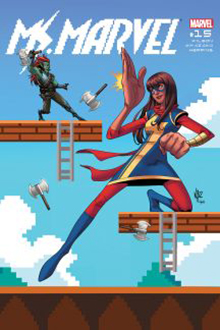 This past week or so has been about getting ready for NYCC. ComicMix has a panel for our successfully funded comics collection, Mine!, which benefits Planned Parenthood. I’ll be there with fellow ComicMix team members Molly Jackson, Mike Gold and Mindy Newell as well as Mine! contributors Tee Franklin, Gabby Rivera and moderator Sheilah Villari. We’ll be at room 1A02 from 1:30 pm to 2:30 pm on Saturday, October 8 at the Javits Center on Manhattan’s mid-town west side. If you’re at NYCC, please come on by – we’ll have a sneak peek at some new art from the book!
This past week or so has been about getting ready for NYCC. ComicMix has a panel for our successfully funded comics collection, Mine!, which benefits Planned Parenthood. I’ll be there with fellow ComicMix team members Molly Jackson, Mike Gold and Mindy Newell as well as Mine! contributors Tee Franklin, Gabby Rivera and moderator Sheilah Villari. We’ll be at room 1A02 from 1:30 pm to 2:30 pm on Saturday, October 8 at the Javits Center on Manhattan’s mid-town west side. If you’re at NYCC, please come on by – we’ll have a sneak peek at some new art from the book!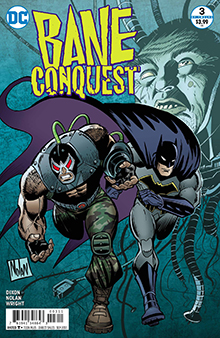
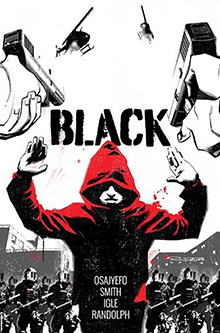 Many of these conservative-leaning comics critics do more than provoke harassment of comics professionals to whom they are opposed: They’ve built a community. Like-minded comics fans who have similar issues with the direction that mainstream comics are going in get together for online hangouts, talk about the comics and creators they like, and more. Some of what they talk about I can even get behind, like how Black Bolt is one of my favorite books that Marvel is putting out right now. It’s easy to paint everyone involved as a troll, and that’s not to say there aren’t any trolls involved, but there are a lot of others who are fans of comics that want to see changes made and get riled up and moved to action when they can rally against perceived hypocrisy and calls to violence from the left.
Many of these conservative-leaning comics critics do more than provoke harassment of comics professionals to whom they are opposed: They’ve built a community. Like-minded comics fans who have similar issues with the direction that mainstream comics are going in get together for online hangouts, talk about the comics and creators they like, and more. Some of what they talk about I can even get behind, like how Black Bolt is one of my favorite books that Marvel is putting out right now. It’s easy to paint everyone involved as a troll, and that’s not to say there aren’t any trolls involved, but there are a lot of others who are fans of comics that want to see changes made and get riled up and moved to action when they can rally against perceived hypocrisy and calls to violence from the left.
